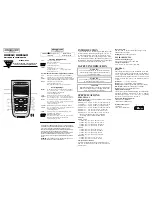
Vivarium Electronics Model VE-200
Thank you for selecting Vivarium Electronics to meet your thermostat control needs. The Model VE-200
has several advanced features including a full featured display, on/off or proportional operation and an
optional night drop feature. Please see the product specifications at the end of this document for full
feature list.
Installation
:
Your new VE-200 thermostat includes the VE-200 unit, a 10 foot replaceable temperature probe
and a 6 foot power cord.
Install the temperature probe in the RJ-11 jack on the rear panel of the thermostat. Use the jack
labeled “probe”.
The included power cord will need to be plugged into the rear panel as well. Plug the power cord
into any standard, grounded wall power outlet.
Plug your heater(s) into the AC Out grounded receptacle. You may use an outlet strip/Surge
Protector for convenience. Your total heater wattage cannot exceed 700 Watts.
Indoor Use Only
Once your VE-200 has been installed you will see a short startup screen before moving to the default
display. The display will show the current time (flashing if it has not been set), the current Set Point and
the current probe temperature.
Warning:
Fire, electrical shock and unit failure can result from improper installation and misuse.
Menu Options
:
You can now program your VE-200 by depressing the “Enter/Menu” button. Be sure to save your new
settings by depressing the “Enter/Menu” button. The VE-200 will confirm the new setting by displaying
“Entry Accepted”. If you do not then your changes will not be saved!
Once you have entered the menu you can navigate through your choices using the +/- keys. You will have
the following options:
Set Daytime Temperature
- Use the +/- keys to select your desired temperature setting.
Night Drop Amount
- This feature will only be accessible if the optional Night Drop Module is
installed. Use the +/- keys to select the number of degrees you want your temperature to drop at
the start of the night temperature period. Example- If your Daytime Temperature setting is 80
°
F
and you wish to drop to 70
°
F at night you would enter a value of “10
°
F”. If you DO NOT wish to
have a night temperature drop then use a value of “0
°
F”. Please refer to the Night Drop Module
instruction sheet for further information on use of the module.
Set Time of Day
- Set the current time. This will display the correct time on the default display
and also act as the clock for your day and night temperature cycle if being used.
Select Heater Mode
-
o
ON/OFF
operation you will be prompted to enter a Hysterisis value. This is the number
of degrees below the Daytime Temperature setting the thermostat will turn power back
on. Example- If your Daytime Temperature is 80
°
F and the Hysterisis is 3 the VE-200
will turn OFF upon reaching 80
°
F and ON when the temperature drops down to 77
°
F.
This setting will increase or decrease the number of times per hour the VE-200 will
switch on and off. The smaller the Hysterisis value the more tightly the temperature will
be controlled.
Hysterysis-
While in on/off mode this setting is the number of degrees below the set
point that power to the heater will be turned back on. For example: A set point of 90
°
with a hysterysis of 2 will turn power to the heater back on when the probe temperature
falls to 88
°
o
Proportional Mode
- This mode will use short pulses of power to your heater to control
the heat output. By gradually increasing or decreasing the amount of power to the heater
the VE-200 is able to maintain very accurate temperature settings. In most applications
this is the preferred mode of operation.
History
- The VE-200 will also store the Hi and Lo temperatures during operation. You can toggle
the default display to view these recorded temperatures by depressing the “history” button. You
can reset the Lo or Hi history value by depressing the “clear” button while the value is displayed.
These values are lost in the event of power outage.
1




















